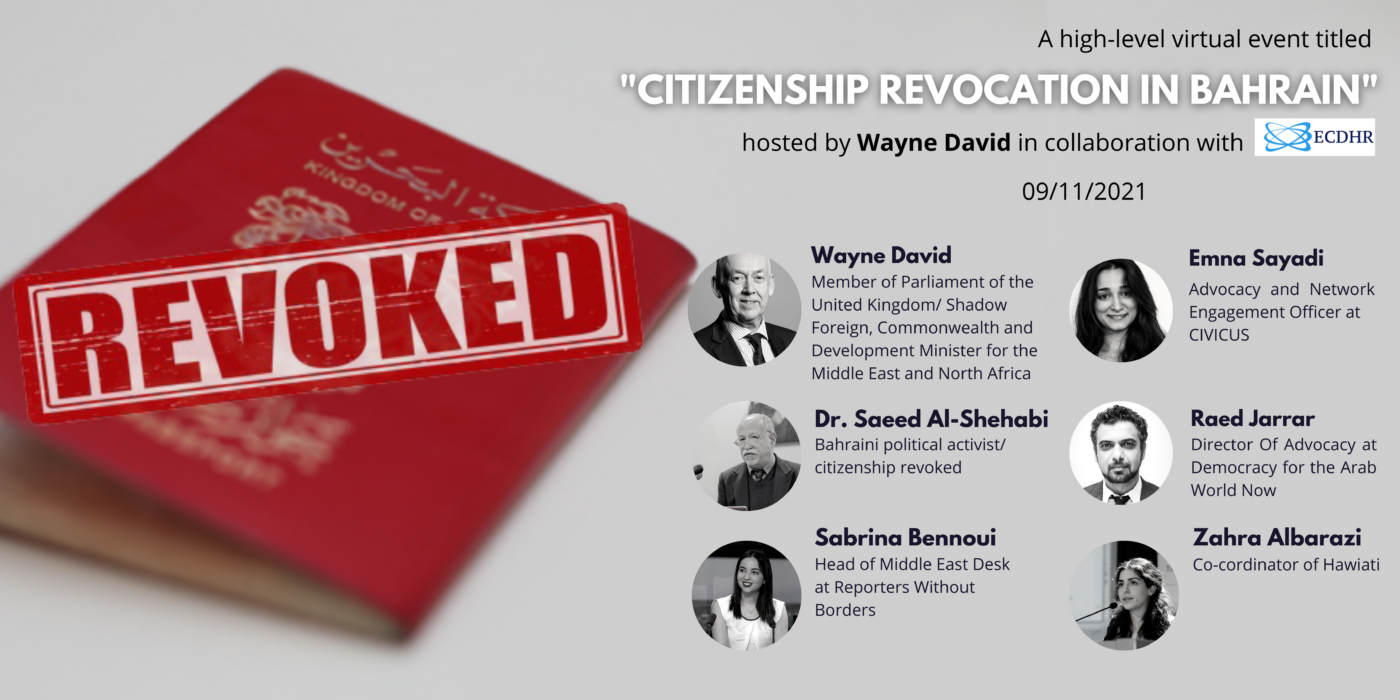If you would like to watch the full event, you can do so here: Event – Citizenship Revocation
9 November, 2021: Wayne David UK Member of Parliament and Shadow of Foreign, Commonwealth and Development Minister for Middle East and North Africa, in collaboration with the European Centre for Democracy and Human Rights (ECDHR) co-hosted a high-level virtual event titled ‘Citizenship Revocation in Bahrain’.
Excellent panelists and experts shed light on the devastating consequences of citizenship revocation used and abused by the authorities in Bahrain.
Aimed at highlighting Bahrain’s abuses, the event depicted different facets of citizenship revocation: its weaponization, regional use, implications with international obligations,
The event was sponsored by Wayne David, Member of Parliament of the United Kingdom and Shadow of Foreign, Commonwealth and Development Minister for Middle East and North Africa who emphasized, in his opening speech, on the continuous repression of human rights in Bahrain. He expressed his concerns over the lack of action from the United Kingdom with regards to human rights and pro-democratic claims.
To raise awareness on citizenship revocation and human rights concerns in Bahrain, the event hosted five distinguished panelists: Dr Saeed Al-Shehabi, Sabrina Bennoui, Zahra Albarazi, Raeed Jarrar, and Emna Sayadi.
In this context, Dr. Saeed Al-Shehabi, a Bahraini political activist and victim of citizenship revocation, provided an insight into the weaponization of citizenship revocation used by the government. He highlighted the nature of citizenship, as a fundamental right inherent to all, and that it could not be used by authorities to repress opposition.
The Head of Middle East Desk at Reporters without Borders, Sabrina Bennoui, addressed freedom of press and expression in Bahrain. She mentioned the inexistence of press freedom in the country and emphasized on the intrinsic violence of the procedure: the message conveyed is that an individual cannot be part of the nation. As a result, activism for human rights in Bahrain is conducted abroad, but no freedoms can be advocated for within the country.
Zahra Albarazi, a co-cordinator of Hawiati, the MENA Statelessness Network adressed the use of discrimination by Bahraini authorities that should be taken into consideration when analyzing the intensive repression resulting from citizenship revocation. She detailed the international legal framework and regional implications.
Finally, Raeed Jarrar gave a few words on the implications of citizenship revocation at the regional level. Indeed, such a repressive tool is not only used by Bahrain but is used against human rights defenders across the Middle East.
Unfortunately, due to unforeseen circumstances, Emna Sayadi, Advocacy and Network Engagement Officer at CIVICUS was unable to attend.
Following the panel, questions from the audience were raised and focused on how best to address the human rights violations in Bahrain, and how to influence any potential change for the better.
In their closing remarks, the moderators called for urgent action by the UK Parliament and thanked the panelists for being a voice for those who may otherwise be silenced.

